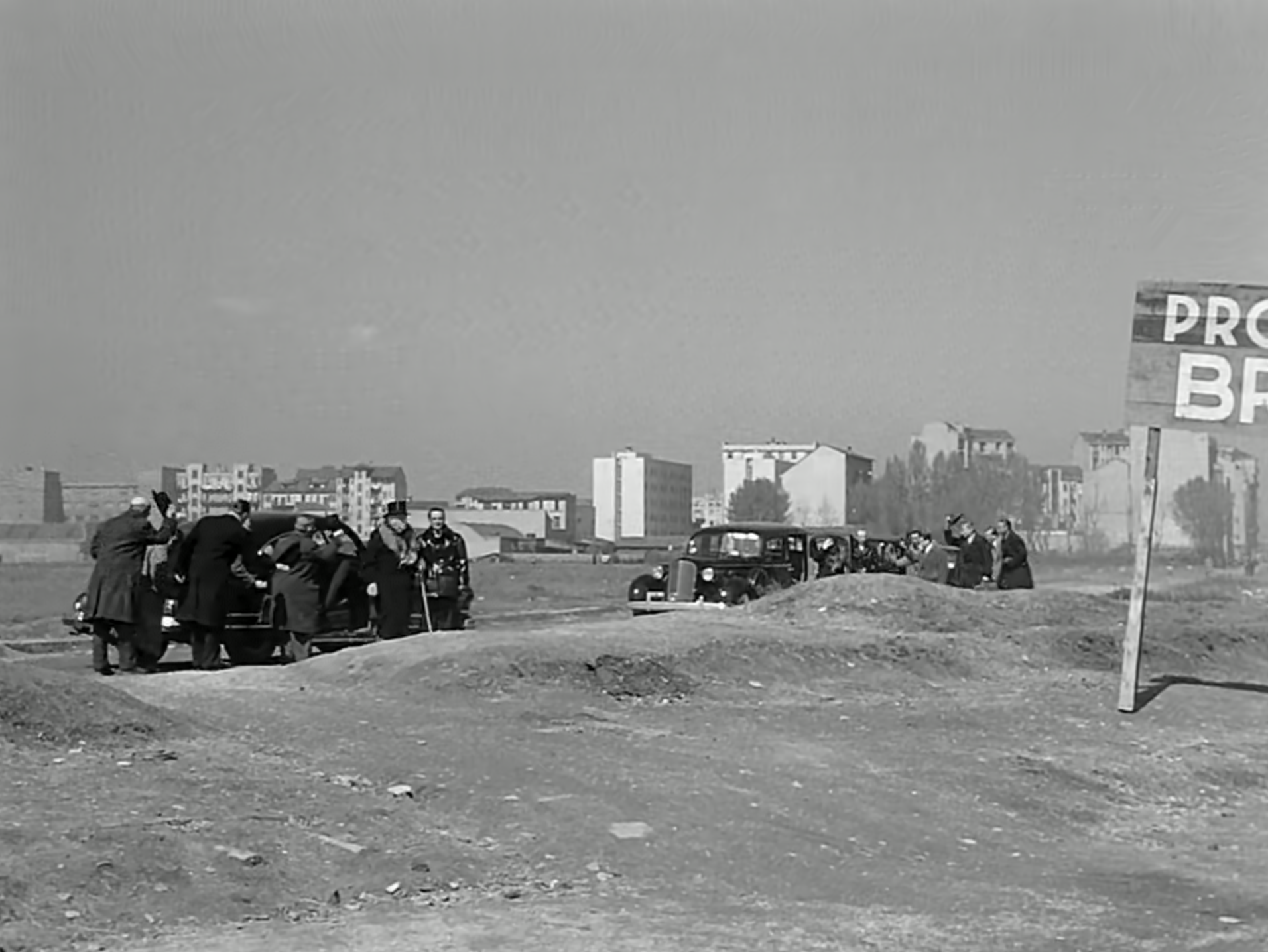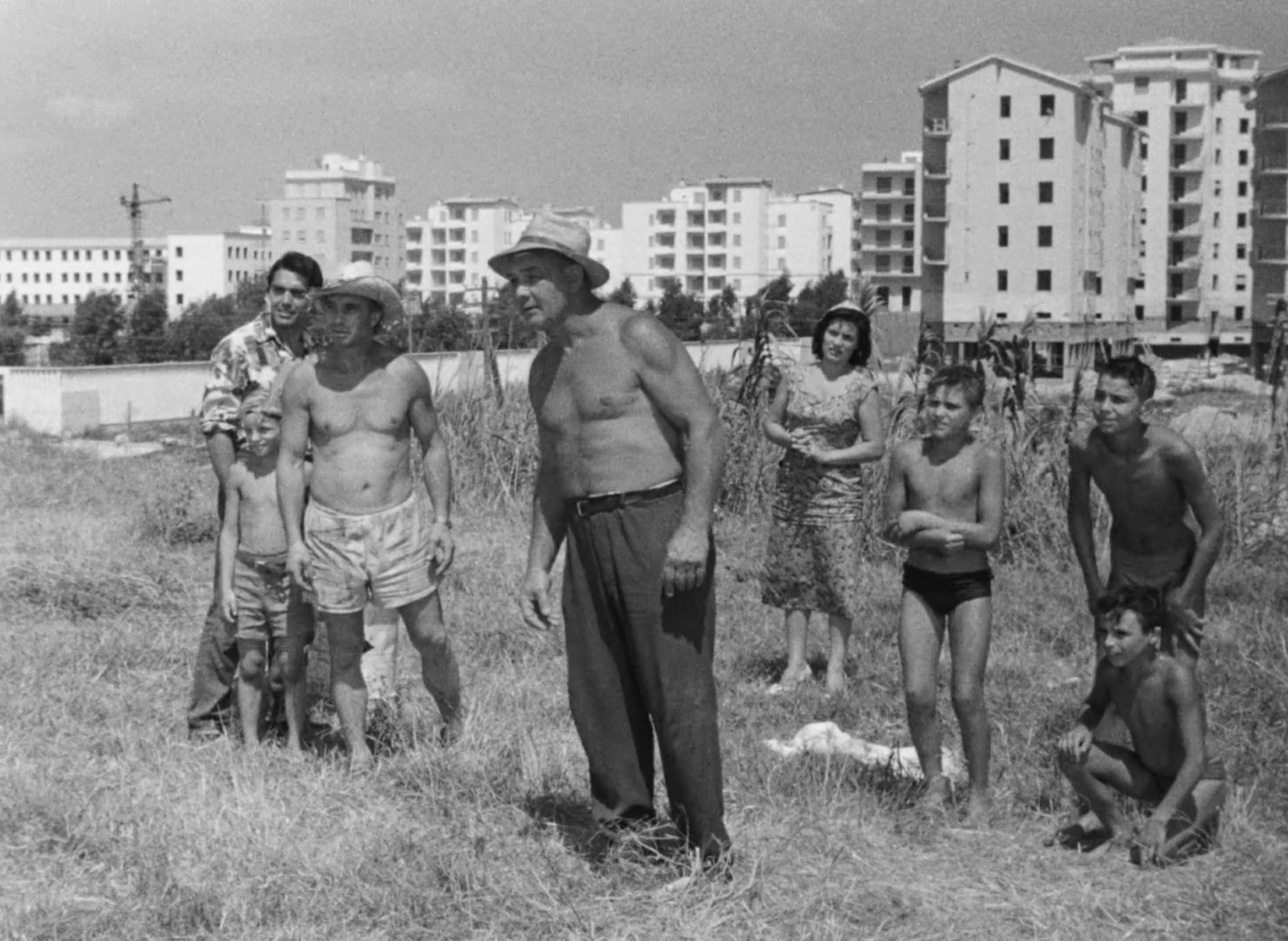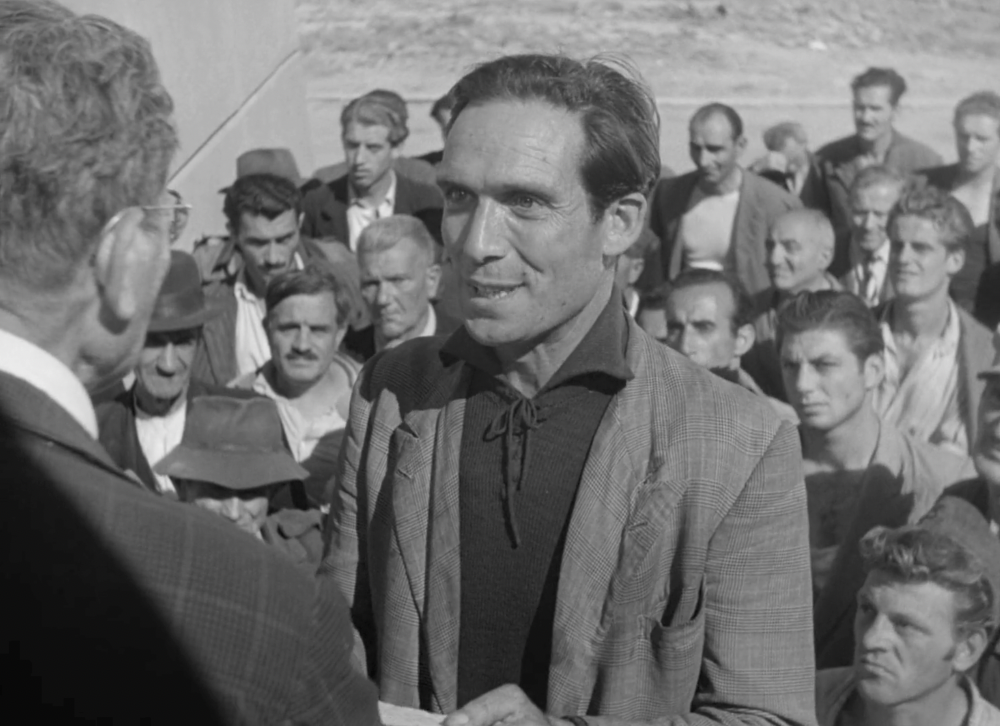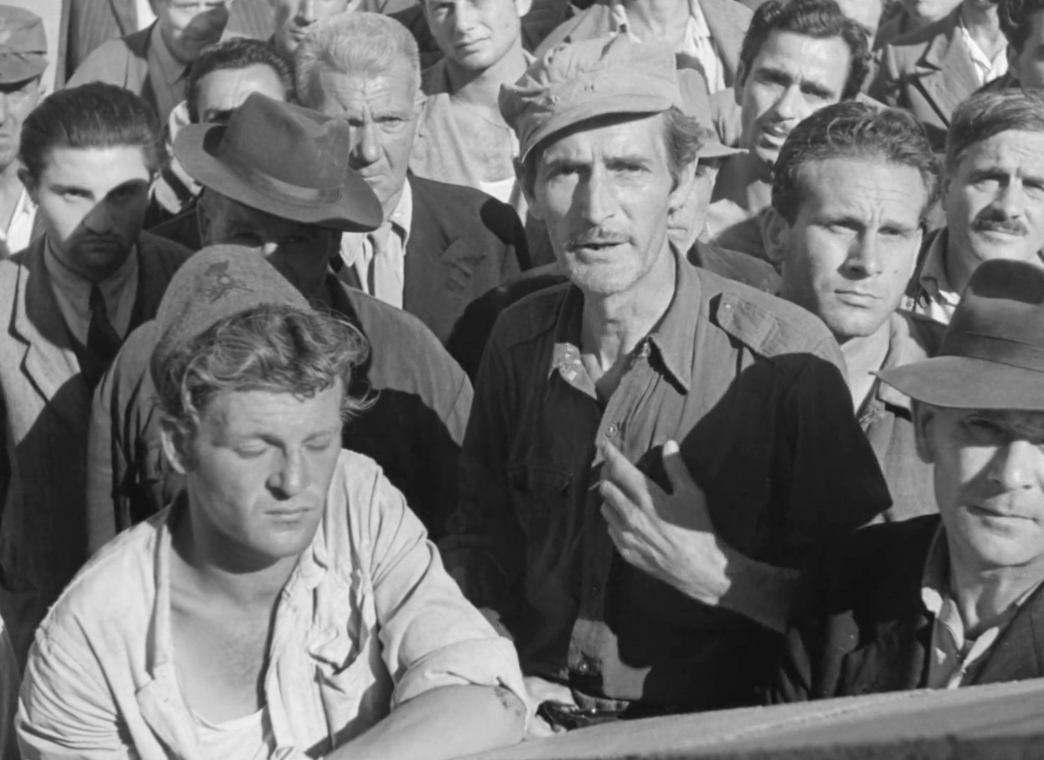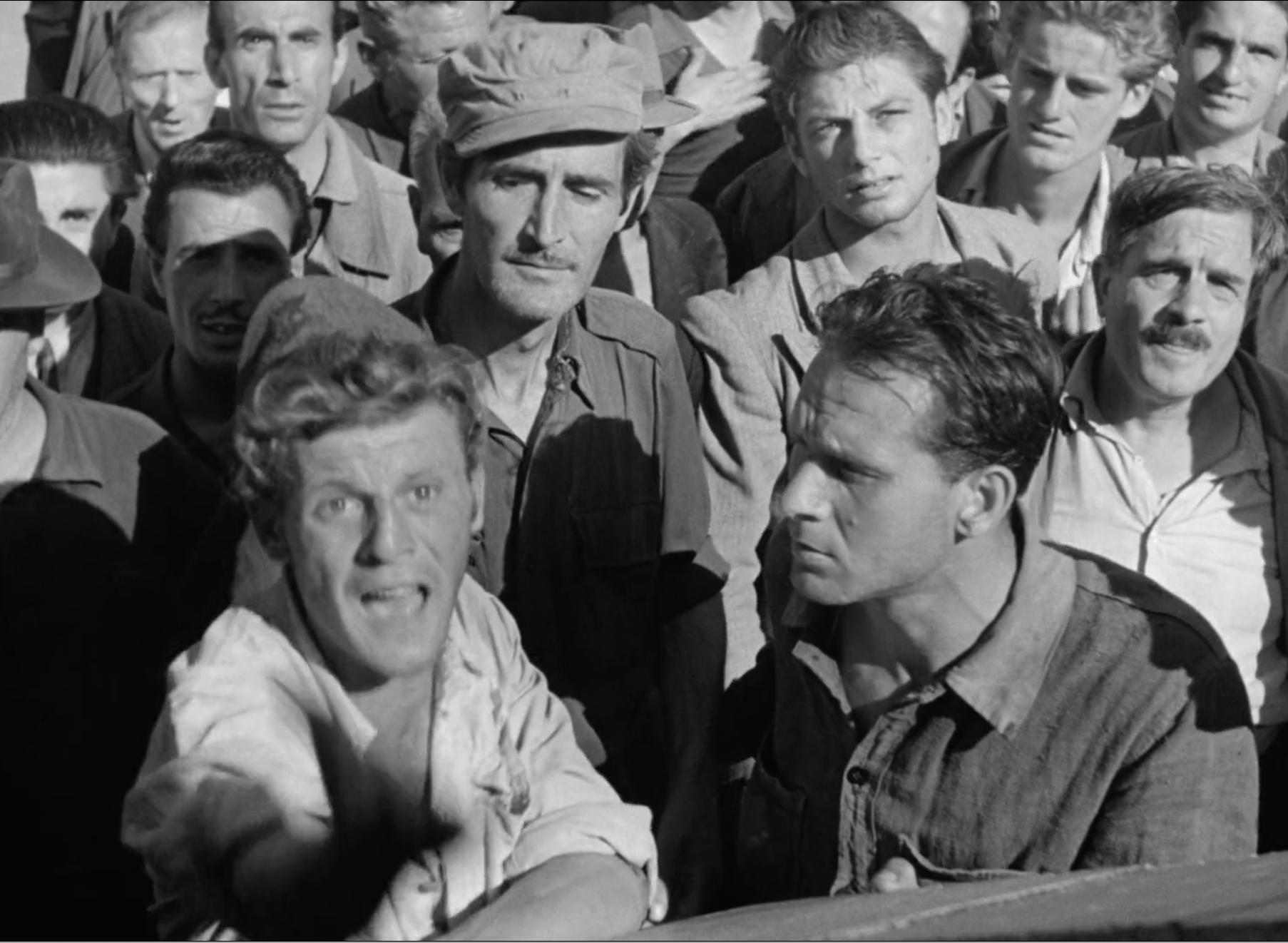Regia / Director: Vittorio De Sica, 1948
Sceneggiatura / Screenplay: Cesare Zavattini, Suso D'Amico, Oreste Biancoli, Adolfo Franci, Gherardo Gherardi, Gerardo Guerrieri
Soggetto / Story: Cesare Zavattini
Fotografia /Cinematography: Carlo Montuori
Mentre appaiono i titoli di testa, vediamo che è una giornata di sole a Roma, non è passato molto tempo dalla Seconda Guerra Mondiale. Un autobus si avvicina a un gruppo di edifici bianchi e squadrati.
As the opening titles appear, we see it’s a sunny day in Rome, not much time has passed since World War II. A bus is approaching a cluster of blocky white buildings.
Quando l'autobus si ferma, scende una folla di uomini a testa china. Camminano lentamente verso l'ufficio di collocamento, sembrano abbattuti.
When the bus stops, a crowd of men comes out, heads bowed. They walk slowly toward the employment office, seeming defeated.
Qualcuno borbotta, "Sono già due settimane che vengo qua".
Guardando i documenti, il funzionario chiama: "Ricci?" Gli uomini si guardano intorno. "C’è Ricci?"
Someone mutters. “It’s already two weeks that I’ve been coming here.”
Looking at his papers, the official calls out: “Ricci?” The men look around. “Is Ricci here?”
Un uomo tra la folla, con un berretto, va a cercare il suo amico, gridando: "Ricci!"
A man in the crowd, wearing a cap, goes to look for his friend, yelling, “Ricci!”
La macchina da presa si allontana e vediamo l'uomo con il berretto correre verso di noi. Donne in abiti estivi passeggiano per la strada.
I muri degli edifici sono scanditi da file di finestre, alcune rigidamente rettangolari, altre con la parte superiore ad arco. Molte sono semicoperte da piante frondose. Da altre, il bucato è steso al sole ad asciugarsi.
The camera pulls back and we see the man in the cap running toward us. Women in summer dresses are strolling down the street.
The buildings’ walls are patterned with rows of windows, some starkly rectangular, some with arched tops. Many are half-covered by leafy plants. From others, laundry hangs in the sun to dry.
I palazzi sono in mezzo a un terreno altrimenti desolato. La scena ci ricorda lo sviluppo urbanistico visto in Miracolo a Milano (Vittorio De Sica, 1951) e, alla periferia di Roma, in Le notti di Cabiria (Federico Fellini, 1957) che ha avuto luogo durante il boom economico del dopoguerra.
The buildings stand in the midst of otherwise empty land. The scene reminds us of the urban development seen in Miracle in Milan (Vittorio De Sica, 1951) and, on the outskirts of Rome, in Nights of Cabiria (Federico Fellini, 1957) that took place during the postwar economic boom.
L'uomo trova Antonio Ricci (Lamberto Maggiorani) seduto a terra vicino a una fontanella. "Ti vogliono. Sei sordo? Andiamo!"
Antonio si alza e si toglie la polvere dalla parte inferiore dei pantaloni. I due uomini corrono insieme verso l'ufficio.
The man finds Antonio Ricci sitting on the ground by a water fountain. “They want you. Are you deaf? Let’s go!”
Antonio gets up and dusts off the seat of his pants. The two men run to the office together.
Mentre arrivano, appare un altro autobus. Una donna con un secchio di metallo si dirige verso la fontanella.
As they arrive, another bus appears. A woman with a metal bucket is heading toward the water fountain.
Il burocrate sta ancora leggendo dai suoi documenti. Gettando le mani in aria, un uomo in testa alla folla dice: "Quindi noi muratori dovremmo morire di fame?"
"Te la prendi con me! Io non ci posso fare proprio niente. Un po' di pazienza e vediamo di sistemarvi tutti. Sono qui per questo. Vedremo cosa possiamo fare".
The bureaucrat is still reading from his papers. Throwing his hands in the air, a man at the front of the crowd says, “So us bricklayers should just starve?”
“You’re taking it out on me! I can’t do anything about it at all. A little patience and we’ll get you all set. That’s what I’m here for. We’ll see what we can do.”
Antonio sale i gradini e il funzionario gli dice: "Ricci, c’è un posto per te".
"Un posto?" Centrato nell'inquadratura, Antonio è magro. Indossa un abito malconcio e una camicia di maglia, allacciata al collo. Sullo sfondo, gli altri disoccupati osservano.
Antonio ascends the steps, and the official tells him, “Ricci, there’s a job for you.”
“A job?” Centered in the frame, Antonio is thin. He wears a battered suit and a knit shirt, laced at the collar. In the background, the other unemployed men look on.
"Attacchino".* L'uomo estrae alcuni fogli dalla sua cartella. "Devi presentarti al centro affissioni. Dai questo documento e portati il libretto". Antonio abbassa lo sguardo sul documento.
*"Attacchino" è il mestiere di affiggere manifesti per le strade della città.
“Putting up posters.” The man takes some papers out of his folio. “You have to report to the poster center. Give this document and bring your work booklet.” Antonio looks down at the document.
*”Attacchino” is the job of putting up posters in the city streets.
Ma un uomo gli chiede: "Non c'è niente per noi?"
"Mannaggia alla miseria!" esclama Antonio, sorridendo, improvvisamente rinvigorito.
But a man asks, “There’s nothing for us?”
“I’ll be damned!” exclaims Antonio, smiling, suddenly revived.
“E qua? Per noi?” insiste l’uomo.
"Ci sono solo due posti per tornitori, ma tornitori non ce ne sono", spiega il burocrate, alzando le spalle. Antonio lancia un'occhiata alla folla degli uomini che non hanno avuto la sua buona fortuna.
“E se io non sono tornitore devo restare qui a fare la muffa?”
"Non ti sfogare con me!"
“And here? What about us?” the man insists.
“There are just two jobs for lathe operators, but there aren’t any lathe operators,” the bureaucrat explains, shrugging. Antonio glances at the crowd of men who haven’t had his good fortune.
“And if I’m not a lathe operator, do I have to stay here and get moldy?”
“Don’t take it out on me!”
Mentre Antonio sta andando via, il funzionario dice: "Ricci, ricordati di portare la bicicletta!" Antonio si volta indietro, con uno sguardo interrogativo. "Ci vuole la bicicletta. C'è scritto anche lì, no?"
"La bicicletta...? Ce l’ho e non ce l’ho. Subito, no. La posso avere fra un po’ di giorni".
As Antonio is leaving, the functionary says, “Ricci, remember to take your bicycle!” Antonio turns back, with a questioning look. “You need the bicycle. It’s written there, too, right?”
“My bicycle…? I have it and I don’t have it. Right now, no. I can have it in a few days.”
"No, ci vuole subito. Se no, non ti prendono".
Antonio contratta: "Non è uguale? Questi primi giorni faccio il servizio a piedi". I disoccupati stanno dietro di lui, in attesa.
“No, you need one now. If not, they won’t take you.”
Antonio bargains: “Isn’t it the same? These first days, I’ll do the work on foot.” The unemployed men stand behind him, waiting.
"Senti, ce l'hai o non ce l’hai questa bicicletta? Se non ce l'hai, bisogna dare il posto a un altro".
Un altro uomo si fa avanti: "Ce l’ho io la bicicletta!"
L'amico di Antonio interviene gesticolando: "Credi di essere l’unico ad avere la bicicletta?! Anch'io ce l'ho".
Altri uomini si aggiungono. "Anch’io ce l’ho!" "Anch’io!"
“Listen, do you have this bicycle or not? If you don’t have it, I have to give the job to someone else.”
Another man comes forward: “I have a bicycle!”
Antonio’s friend speaks up, gesturing, “Do you think you’re the only one who has a bicycle? I have one, too.”
Other men chime in. “I have one, too!” “Me, too!”
"Ma tu sei muratore" – dice il funzionario –"È un’altra categoria!"
"Cambia la categoria!"
"Non si può".
Antonio sembra preoccupato.
“But you’re a bricklayer,” the civil servant says. “That’s a different category!”
“Then change the category!”
“It can’t be done.”
Antonio looks worried.
L'uomo si rivolge ad Antonio: "Allora, Ricci, la bicicletta c’è o non c’è?"
"C’è, c’è". Nella prima di tante belle composizioni a venire, vediamo il burocrate e Antonio di profilo, tenuti al centro dell'immagine dalle linee geometriche delle pareti di cemento, mentre le teste degli astanti riempiono la parte inferiore dell'inquadratura.
"Sì" – conferma Antonio – "Mi presento con la bicicletta".
The man turns to Antonio, “So, Ricci, do you have the bicycle or not?”
“I do, I do.” In the first of many beautiful compositions to come, we see the bureaucrat and Antonio in profile, held at the center of the image by the geometric lines of the concrete walls, while the onlookers’ heads fill the bottom of the frame.
“Yes,” Antonio confirms. “I’ll report with the bicycle.”
Quando Antonio si gira di nuovo per andarsene, il funzionario avverte: "Non prendiamoci in giro. Se non ti presenti con la bicicletta, non c'è niente da fare".
"E che faccio, aspetto altri due anni? Mi presento con la bicicletta, non ti preoccupare".
As Antonio turns again to leave, the official warns, “Let’s not fool ourselves. If you don’t show up with the bicycle, there’s nothing to be done.”
“And what do I do, wait around another two years? I’ll show up with the bike, don’t worry.”
Antonio passa attraverso la folla mentre l'uomo continua a chiamare nomi. "Cataldi!"
"Eccomi!"
"Manovale per due giorni al cantiere del Tufello, se ti va".
"Mi va, mi va, ci vado subito!"
Antonio passes through the throng as the man continues to call names. “Cataldi!”
“Here!”
“Manual laborer for two days at the Tufello construction site, if you feel like it.”
“I do, I do. I’ll go there right now!”
Antonio si dirige verso casa, affiancato da un'altra donna, questa con due secchi. La sua bicicletta è al banco dei pegni, ma ora ne ha bisogno per sfamare la sua famiglia. Deve trovare un modo.
Antonio heads for home, flanked by another woman, this one with two buckets. His bike is in the pawn shop, but now he needs it to feed his family. He has to find a way.
FINE PARTE 1
Ecco Parte 2 of this cineracconto! Subscribe to receive a weekly email newsletter with links to all our new posts.
A note about the translation:
The dialogue in the cineracconto (photo-story) of Ladri di biciclette (Bicycle Thieves) for the most part reflects the actual spoken dialogue of the film (the battute). Occasionally, we’ve changed a word or phrase to something simpler in order to make the cineracconto accessible to a wider range of language learners. We also sometimes update vocabulary to make the text more useful to language students, or – where a more English word is spoken by the characters – we may change it to the Italian equivalent. For example, in this cineracconto, in Parte 8, we’ve changed “tunnel” to “galleria,” making the text more “Italian” – but without violating the spirit of the dialogue as spoken. In Ladri di biciclette, we’ve translated the Roman dialect spoken by many of the characters into standard Italian. For example, in Parte 1, the line in Romanesco “Un po’ de pazienza e vedemo de sistemavve tutti,” we have translated to “Un po' di pazienza e vediamo di sistemarvi tutti,” in Italian (and “A little patience and we’ll get you all set” in English).
The first cineracconti in this series (up to The Southerner, June 2021) were at a more advanced level and included pretty much every scene and nearly all the dialogue verbatim from our films. The later cineracconti (starting with Ossessione, September 2021) are at an intermediate level: they are shorter and omit some details from the film. (To see the more advanced cineracconti, please go to the blog Welcome page: the Italian movies are listed on top; Italian and international films are directly below, in chronological order.)
In writing our cineracconti, we aim for a fluid, standard Italian. In the English version of the dialogue, you will not see a literal – word-for-word – translation, but rather an accurate representation of how someone would actually say the line in standard American English. Occasionally, we maintain something of the Italian syntax to make the translation more accessible to lower intermediate students.
We love language and we sometimes spend a very long time debating a particular word or phrase. We’d be very happy to hear your thoughts about our translations. Write to us at info@liconoscevobene.net!










